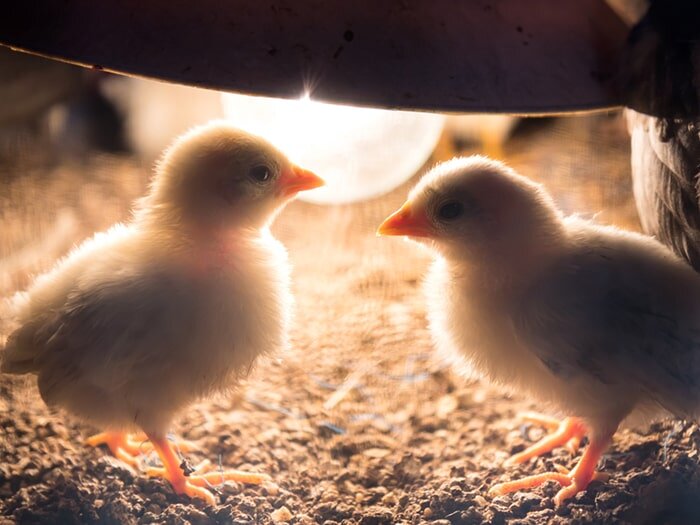Bringing home your baby chicks is an exciting milestone in raising backyard chickens. There are three key essentials for raising strong baby chicks: Warmth, water and feed. Start chicks strong by providing a complete chick starter feed from day 1 through week 18.
For those of us welcoming new chicks, how can we give them a solid start? To best transition chicks into a flock, provide comfort, care and complete nutrition from day one. A chick never gets over a bad start. The actions we take before chicks arrive and the care we provide in the first few days can help set-up our chicks to be happy and healthy long-term.
Before baby chicks arrive: Set up the brooder
Set up your brooder about 48 hours before your chicks arrive. This allows time for bedding and equipment to dry and the temperature to set.
Introduce baby chicks to water
Once chicks arrive, introduce them to the brooding area. Water, at room temperature, should be available, but wait a couple hours to introduce feed. This gives chicks a couple hours to drink and rehydrate before they start eating, fresh, quality water is essential for healthy chicks. Dip the beaks of several chicks into the water to help them locate it. These chicks will then teach the rest of the group to drink. Monitor the group to ensure all chicks are drinking within the first couple hours.
Teach baby chicks to eat
After chicks have had a chance to rehydrate, provide the nutrients they need through a complete chick starter feed. Provide a chick starter feed with at least 18 percent protein to help support the extra energy needed for early growth. The feed should also include amino acids for chick development; prebiotics, probiotics and yeast for immune health; and vitamins and minerals to support bone health. To provide all the nutrients chicks need for a strong start, choose a starter-grower feed from the Flock Strong® Feeding Program. Complete starter feed options include: Purina® Start & Grow®, Purina® Start & Grow® Medicated, Purina® Organic starter-grower and Purina® Flock Raiser.First, teach the chicks to eat by placing feed on clean egg flats, shallow pans or simple squares of paper. On day 2, add proper feeders to the pens. Once chicks have learned to eat from the feeders, remove the papers, pans or egg flats.
Adjust feed as baby chicks develop
To keep feed fresh: Empty, clean and refill waterers and feeders daily. Also, raise the height of feeders and waterers so they are level with the birds’ backs as chicks grow. As chicks mature, their nutritional needs change. At age 18 weeks, adjust the feed provided to meet the birds’ evolving nutrition needs. Transition layer chicks onto a higher-calcium complete feed, like Purina® Layena® Crumbles or Pellets, when they begin laying eggs at age 18 to 20 weeks. For meat birds and mixed flocks, choose a complete feed with 20 percent protein, like Purina® Flock Raiser® Crumbles and feed this diet from day one through adulthood.Orders
Services
About
Your Wilco Store
Store Hours
Monday to Saturday:
8 AM to 7 PM
Sunday: 9 AM to 6 PM
Need Help?
For questions or help with online orders call: (888) 78-WILCO
Limited to stock on hand. Some items may vary from photos. Because of store size limitations or geography, some items featured may not be available in all stores but will be made available by special order during sale periods at advertised prices. All sale prices listed as “dollars off” or “% off” are discounted from our regular posted shelf price, not from discounts given with specialty, bulk or pallet pricing. Reseller and Drop-shippers must contact us for pre-approval to place orders with the intent to re-distribute.
© 2026, Wilco Farm Store
